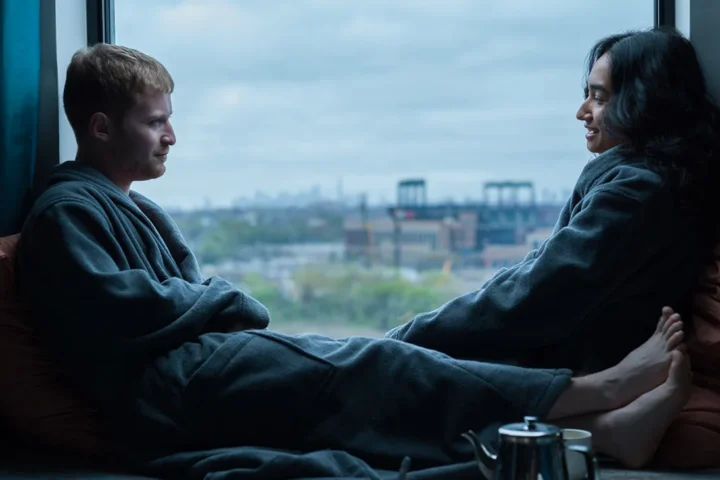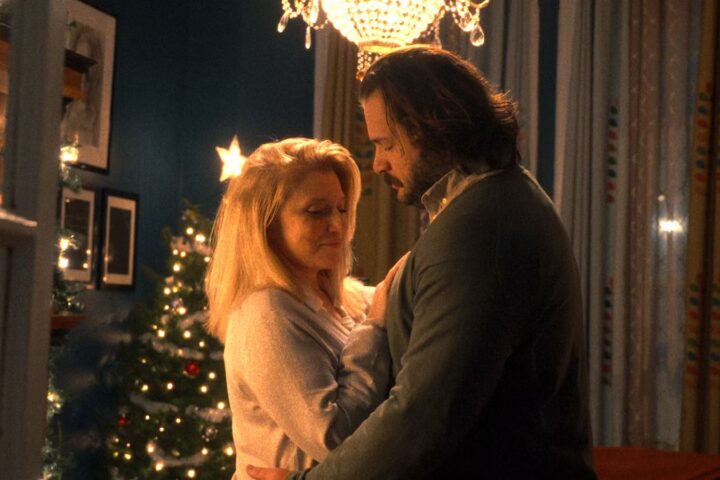In News of the World, based on the 2016 novel by Paulette Jiles about a Civil War vet roaming the Old West performing the news of the day to paying crowds in tiny towns across Texas, there is something almost comforting in the simple notion of a single source of truth read aloud to Americans by Tom Hanks’ roaming village caller, perhaps because today’s news cycles, bombarding into our discrete echo chambers 24/7, seem less enlightenment than exhaustion. But co-writer and director Paul Greengrass’ engrossing film is also calming, in its own way, as an old-fashioned studio period piece, a handsomely made adventure with a kind heart, professional sheen and people we come to care about.
Part earnestness and part carnival barker, Hanks’ Jefferson Kidd, a former Confederate captain with a solid vocation in what might be called early infotainment, serves the town square need for entertainment, a respite from the harsh realities of the frontier. It’s a vocation that makes him a pittance in coins but also a larger-than-life folk character of sorts, his storytelling skills enlivening local and world headlines from a stack of newspapers stuffed into his satchel. He’s keenly aware of which stories best resonate with populist cravings—accidents, news of the strange, high drama and the like.
En route and into Kidd’s world comes young Johanna (a striking Helena Zengel), a ten-year-old German girl raised by a Kiowa tribe and displaced in a battle that drove them from their land. She’s displaced again when her former protector, a Black man, is murdered in a lynching, his carriage destroyed. Kidd becomes her unlikely guardian in transporting her to relatives near San Antonio, where he may perhaps rejoin his long-suffering wife. But Helena’s inability to speak English, and her near feral survival instincts, render her both obstinate and bewildered. So the picture sets up its central theme—one of home, or the elusiveness of it, and where we find it.
The picture charts their trek across dangerous territories while they predictably grow more fond of each other and find expected ways to communicate, teaching each other words, etc. This may sound hoary and familiar, but there is well-earned life in their bonding as they face down continuous threats (including a memorable baddie played with swagger by in The Climb’s Michael Angelo Covino) on the open road and in lawless, speck-on-the-map settlements. Along the way, Johanna slowly finds intrigue in Kidd’s profession, while her guide experiences quietly paternal stirrings.
Greengrass gives Hanks, the most likable of American movie stars, plenty of space to convey an emotional build that plays out in dual threads, which include a potential reunion with a wife in San Antonio (a vivid period recreation of a budding town on the verge) and surprisingly potent surrogate, parent-child separation. It’s a terrific performance calling upon the star’s trademark kindness and empathy. And the marvelous Zengel’s sad, faraway eyes suggest visions of the world in all its traumas, perhaps impossible for even Hanks’ goodness to eradicate.
News of the World is a two-hander, ultimately favoring the personal over the epic, despite its milieu and broader statements about both personal and cultural displacement. The screenplay, written by Greengrass and Luke Davies, effectively depicts a Reconstruction Era America gaining awareness of—or at least a desire to know from—a wider world outside the big skies of Texas, and even the United States. In many ways that is the opposite of today’s America, where insular “America First” philosophies have revealed curiosities of certain segments to be far narrower. The movie gets great mileage out of darkened, kerosene-lit town halls where Kidd’s tales of far away triumphs and tragedies play out. In one intriguing moment of showmanship, he shifts a town’s political leanings, simply by virtue of personality: say it loud, with conviction, and they will follow.
This elegant throwback may not break new ground, but as an examination of the understanding and partnership between two unlikely people who have lost nearly everything amidst a changing world (beautifully lensed by DP Dariusz Wolski) yet continue searching for a destination, or an idea, of home (that both we and they know will not materialize as longed for), it moves toward an undeniably poignant conclusion.
Despite the picture’s tense moments (including a gripping, sustained canyon shootout), Greengrass (United 93, Bloody Sunday, Captain Philips and a handful of Jason Bourne pictures), one of cinema’s punchiest action helmers, shows restraint from his usual tack-sharp tension. And News of the World requires no such kinetic edge. Instead, it is imbued with a burnished reverence for the Old West, yes, but for old Hollywood westerns.
3 1/2 stars.



